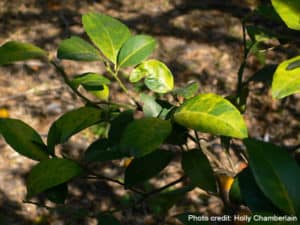Your trees are trying to tell you something. Learn how to interpret the signs.
For success in citrus production, growers need to be in tune with what’s going on in their grove. When something doesn’t appear right — whether it’s one tree or an entire block — some kind of action is needed. Of course, action means time, and time means money. Making the wrong decision in this case can cost you your crop and potentially a whole lot more.
 When trying to correctly identify if a tree is sick or just lacking the proper nutrients, Ryan Atwood, a former product representative for Winter Park, Florida-based KeyPlex, says there’s no reason to dig too deep as the two problems are one and the same. “Most of the time for commercial citrus producers, it is very rare you run into a true deficiency,” he says. “If you see a deficiency, there are most likely two causes: you have a grower that is not doing such a great job and is looking to save money by not using as much fertilizer, or you’re talking about a disease issue that has compromised the tree’s health in some way.”
When trying to correctly identify if a tree is sick or just lacking the proper nutrients, Ryan Atwood, a former product representative for Winter Park, Florida-based KeyPlex, says there’s no reason to dig too deep as the two problems are one and the same. “Most of the time for commercial citrus producers, it is very rare you run into a true deficiency,” he says. “If you see a deficiency, there are most likely two causes: you have a grower that is not doing such a great job and is looking to save money by not using as much fertilizer, or you’re talking about a disease issue that has compromised the tree’s health in some way.”
Atwood, having previously spent six years with University of Florida’s Institute of Food and Agricultural Sciences on the research and Extension side of things, explains HLB (greening) is a phloem-limiting bacteria, which inhibits proper movement of nutrients in the tree. “When you see an HLB-symptom (mottled leaves, poor growth, fruit drop), basically it’s a nutritional deficiency symptom,” he says.
As with any kind of troubleshooting, it pays to be diligent and thorough in your scouting. To ensure accuracy, Atwood says it pays to take a closer look in order to nail down a spot-on diagnosis. “The best way to determine is to take leaf samples,” he says. “Typically, in Florida, we recommend doing this from the end of July through August into early September. The year’s flush is hardened off; you take the leaf samples, and find out what your nutritional level is. If you pull leaf samples from a tree with greening, you’re going to come back with deficiencies in zinc, manganese, and other micronutrients. However, there’s always potential you have a healthy tree that you have deficiencies on. But more than likely, in most groves with growers employing good practices, it’s going to be a disease-related issue.”
With HLB not giving growers many viable options since its discovery, many started to turn to nutritional therapies to help fortify their groves until a cure can be found. “On trial work we’ve done in Florida, when you spray micronutritionals periodically throughout the year, you not only can help alleviate symptoms being caused by disease, but also maintain the yields,” Atwood adds.
In the meantime, growers have started to see other benefits to this approach beyond mere survival. “Micronutrients for tree health is really important and should be emphasized,” Atwood says. “With today’s nutritional programs, the healthy trees are producing so much more fruit than they were previously, because this increased nutrition — foliar in particular — is increasing fruit set, fruit size, and increasing yields.”
Though it is difficult to be able to predict how hard maladies such as HLB, canker, blight, or black spot will strike your plantings, a proactive approach can help ensure your trees are getting the right amount of nutrients to fight the good fight. “Preemptive spraying is the norm and warranted with disease pressure,” Atwood says.
While growers started spraying more nutritional products out of need of disease pressure, Atwood doesn’t see that trend dipping, even if a cure for HLB was found tomorrow. “It’s a no-brainer and a winner,” he says. “Most growers are going to have sick trees. The need for extra nutrition is here to stay, especially from a productivity standpoint.”
While many citrus fertilizers are available, studies show that KeyPlex micronutrient products are effective in reducing the effects of HLB by supplying key micronutrients. For more about KeyPlex citrus solutions, visit http://www.keyplex.com/crop-keycards/citrus-orange-keycard.
